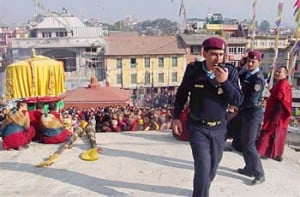
Nepalese police monitor Tibetans who gathered on December 10th to mark International Human Rights Day.
Tibetans in Nepal and around the world annually mark December 10th with traditional Buddhist prayer ceremonies and speeches by local Tibetan leaders.
Nepalese police chief in Boudha, Sergeant Bhattari, on orders from the Nepalese Home Minister Tappa, had warned the Tibetans “not to give any speeches, nor distribute any written pamphlets, nor make any criticism or demonstration against our neighbor China.”
“We will not allow any shouting or marching in the name of Free Tibet by these Tibetans on Human Rights Day in Nepal,” Sergeant Bhattari told ICT. “Prayers are fine. Nothing more.”
Permission had been granted to allow only the prayer service gathering in Boudha after days of negotiations between Nepalese government officials and the Tibetan Welfare Office in Nepal. Human Rights Organization in Nepal (HURON) pressured Home Minister Tappa to allow the Tibetans to gather and assured the Nepalese government that the Tibetans would not demonstrate against China.
Armed police monitored the two-hour ceremony led by Tibetan Buddhist monks and community leaders.
Following the prayer ceremony, police broke up a group of 40 Tibetan elders from performing a traditional circle dance, and ordered the crowd to immediately disperse.
Today’s curtailing of peaceful Tibetan activities by Nepalese police is a continuation of Nepal’s tightening grip on the Tibetan community. It is known that the Chinese embassy in Nepal regularly objects to the Nepalese Foreign Ministry when any public gathering of Tibetans in Nepal is planned, including school and community functions.
On December 9th, China’s official English language newspaper, the People’s Daily, quoted Nepalese Foreign Minister Narendra Bikram Shah as saying that Nepal will always support a One-China Policy.
“We want to enhance our special relationship with China , especially with China’s Tibet Autonomous Region,” Shah told a Chinese delegation from the Tibet Autonomous Region currently visiting Kathmandu.
Today’s curtailing, as well as recent incidences evidences growing pressure on Nepal by China to crack down on Tibetans.
On July 6th, Nepalese police barred the Tibetan community from holding a celebratory dinner for the Dalai Lama’s birthday at the Radisson Hotel in Kathmandu. A few weeks later, police blocked a press conference called by the Dalai Lama’s Representative in Nepal, Wangchuk Tsering.
On Sept 2nd, when Tibetans annually celebrate Tibetan Democracy Day in Boudha, Wangchuk Tsering was taken away and held for one day by Nepalese police when he arrived to give a speech to mark the occasion.
“The curtailing net is getting tighter and tighter on us,” Wangchuk Tsering told ICT.
“Each time they are demanding we cut out more and more from our celebrations. Today no speeches, perhaps next time no prayers will be allowed.”
In related news, a judge in Kathmandu rejected a legal appeal brought by human rights lawyers on behalf of eleven jailed Tibetans serving ten-year prison sentences in Kathmandu. The Tibetans had been arrested and charged as illegal aliens (see story).
The continuing problems facing Tibetans legally residing in Nepal, as well as for those refugees who are transiting through Nepal en route to India, was documented in ICT’s report “Dangerous Crossing, Conditions Impacting the Flight of Tibetan Refugees in 2001” as well as in another recent report by the Tibet Justice Center Tibet’s Stateless Nationals; Tibetan Refugees in Nepal (available at www.tibetjustice.org).

